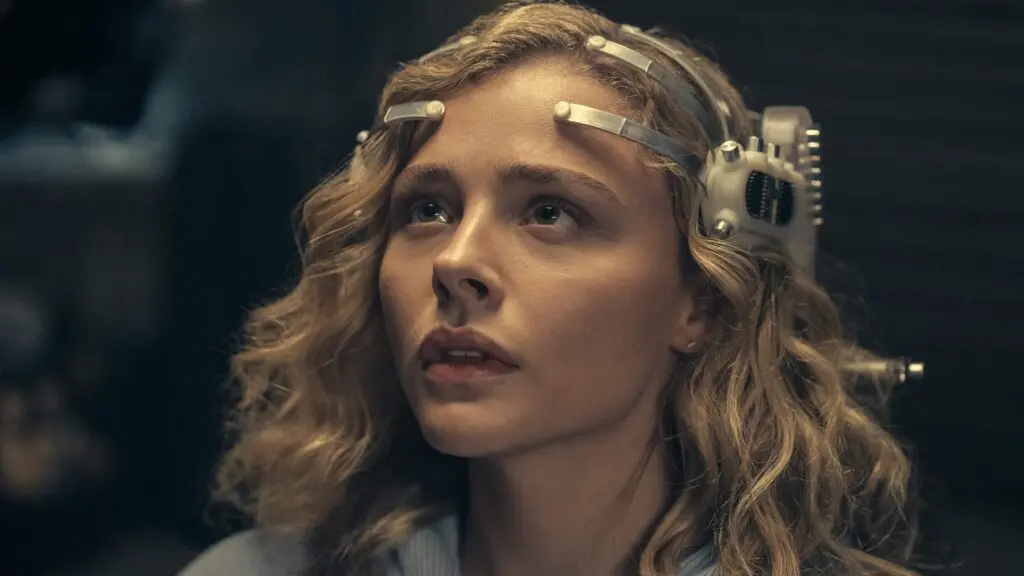Summary
The Peripheral is atmospheric, gory, and cinematic, while its world-building is finely crafted, although the villains are paper thin and the techno-jargon can be convoluted at times. Overall, this is exciting sci-fi that hits more times than it misses.
Dystopian sci-fi is a booming business right now, mirroring our current worldview in scary detail. It would seem that viewers aren’t satisfied with the day-to-day horrors the news has to offer alone and wish to indulge in nightmarish visions of an apocalyptic future as well. Shows like Black Mirror and Westworld expertly tap into this morbid fascination to paint a problematic future where technology runs amok, and now Prime Video is cashing in on the action too, adapting the notoriously un-adaptable William Gibson’s 2014 novel The Peripheral.
The series, from creator Scott Smith (A Simple Plan) and executive producers Jonathan Nolan and Lisa Joy (Westworld), takes place in a very believable near-future, 2032 to be exact, where VR gaming has become terrifyingly realistic and 3D printing is now a lucrative, everyday commodity. Flynne Fisher (Chloe Grace Moretz) lives with her blind mother, Ella, and tattooed brother Burton (Jack Reynor). He’s an ex-Marine who now makes a living playing these authentic games online, but Flynne has always been the better player, using his avatar in secret. Burton is offered the chance to test out a cutting-edge headset for a rather handsome payout, and of course, Flynne is the only plausible candidate for the job.
Flynne dons the headset, counts back from ten, and wakes in London, 2099. She finds herself inhabiting Burton’s authentic avatar and riding a motorbike through the cinematic streets of the capital. The first two instalments are directed by Vincenzo Natali (Cube), who captures a futuristic London with striking visuals. The skyline is dominated by these towering statues of historic idols, while sinister robots roam the streets. It’s impressive world-building that is well-thought-out and elegantly crafted. Flynne is ordered to complete her first mission and finds the experience to be exhilarating. She feels everything, even the painful moments, but can’t get enough.
Obviously, everything is not as it seems. As the plot unravels, malicious bad guys enter the fray, and a mystery begs to be solved. The series cuts between the rural townsfolk of the Blue Ridge Mountains and the clinical, murky world of a futuristic London. There are villains in both worlds, and these stereotypical criminals start off rather one-dimensionally, with clichéd sound-bites and almost cartoonish killing methods, but the mystery at the heart of this story is worth sticking with. The Peripheral works best when it operates like a video game itself. There are riddles to crack and missions to complete. Whilst the VR gameplay looks stunningly unique.
The first episode introduces us to this engaging narrative and these cinematic visuals, working like a mini movie of sorts, with a runtime of 70 minutes. In this sense, it feels a lot like a Black Mirror episode, yet The Peripheral doesn’t have the luxury of concluding like a one-off episode does; the show must go on. This is the main issue with the series: it cannot live up to that impressive premiere episode. The show plays its hand too early and suffers due to its own limitations. The story is dragged out to fill its eight-episode season, with lots of expositional dialogue and needless backstory impeding on the action. The Peripheral thrives when it focuses on cryptic mysteries and intense action sequences, but it cannot sustain that momentum for its entire run.
Overall, this is an atmospheric and enticing series that graciously brings William Gibson’s horrifying dystopia to life. The show boasts spectacular visuals and a cinematic score. Whilst Chloe Grace Moretz makes for a surprisingly affable lead, and Jack Reynor is a definite star in the making. It’s great to see sci-fi of this nature getting a decent opportunity to play to the masses. Now, let’s hope the industry figures out a way to adapt Gibson’s debut novel, the 80s epic Neuromancer.
Read More: What Are The Differences Between The Peripheral Show and the Book?




